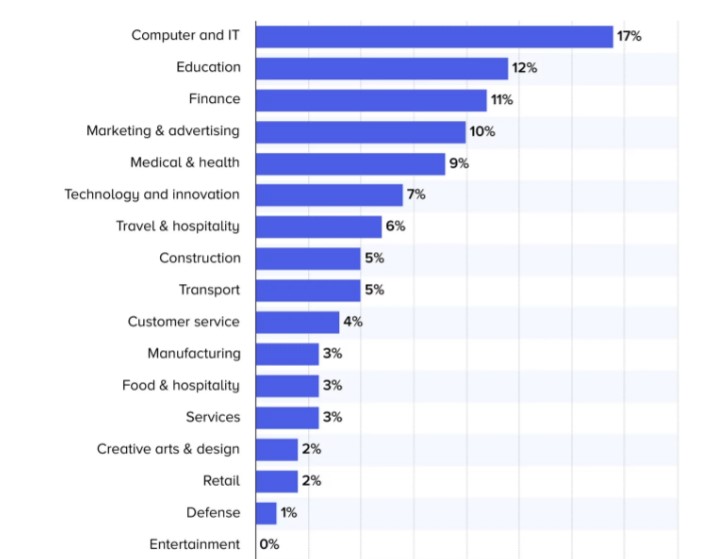In the past couple of years, we have witnessed revolutionary breakthroughs in technology. In a post-pandemic world, anything is possible. Technology will continue to influence how we live and work in 2023. As more products and services include artificial intelligence (AI) and machine learning (ML), they become smarter and more capable of carrying out jobs that were previously solely performed by humans.
Here are some trends that will shape 2023:
- Web3/Blockchain: The blockchain ledger is being utilized in various contexts, including the protection of patient data, accelerating transaction times, reducing digital fraud, and more. By 2030, according to a report by Statista, the market is projected to grow by a CAGR of 82.8% touching $1,235.71 billion.
- Asset Tokenization: It is anticipated that some sectors, like healthcare and finance, may choose private blockchains in the years to come due to the requirement for greater security and privacy. The BFSI, retail, travel & hospitality, healthcare, IT & telecom, and media & entertainment are the different market segments for tokenization. The BFSI industry is anticipated to hold the most significant market share for tokenization in 2023. The expansion of this market is attributed to the rise in payment security solutions adoption and data breaches in the BFSI industry.
- Web AR: Some benefits of using Augmented Reality in business are boosting sales, minimizing returns, increasing customer engagement, collecting data on customer preferences, and providing a contactless experience. Users can now virtually try clothes and jewelry before purchasing on websites like Candere and Hazoorilal with the help of Web AR. Beauty and wellness platforms like Nykaa and Purplle let one try on lipstick shades digitally before purchasing them. Leading eCommerce portal for eyewear Lenskart allows customers to try on different frames virtually to choose the right one. Web AR is also used in education, taking the learning process to another level. It can be used to understand complex study models. For eg: Medical students can study human anatomy and even train for surgery on it.
Luminaire, a German-based aggregator of in-home and office lighting solutions partnered with Mantra Labs to create an AR model through paper catalogs, hand sketches, technical/2D drawings, and an interactive product database for products with electrical, luminous, & mechanical specifications.
- Adaptive AI: Unlike conventional AI systems, adaptive AI can modify its own learning strategies to account for changes in the actual world that weren’t anticipated when the system was created. By 2026, Gartner predicts that businesses that have implemented AI engineering methods to create and oversee adaptive AI systems will outperform their rivals in terms of the quantity and speed of operationalizing AI models.
Hitee, Mantra Labs’ industry-specific AI-driven conversational chatbot helps insurance enterprises with customer onboarding by creating workflow automation, ticket queuing, etc.
- Metaverse: According to Forbes, the metaverse will contribute $5 trillion to the world economy by 2030, and 2023 will be the year that determines the metaverse’s course for the following ten years. Further, it says that by 2023, we’ll have more immersive meeting spaces where people can collaborate, develop, and create things.

- Education and learning: Mesh is a mixed reality collaboration and communication platform by Microsoft for staff, faculty, and students to interact using 3D avatars.
- Banking and finance: Metaverse in banking is reaching new heights. From any place, the banking metaverse provides a 360-degree picture of actual banks. One can still use their laptop or mobile device to access Metaverse banking even if they don’t own a VR headset.
- Healthcare: Patients and doctors can communicate in virtual 3D clinics under the umbrella of telemedicine and telehealth, a notion made popular by the Metaverse after the pandemic. Another example is the Metaverse-powered Digital Twin technology, which enables the creation of a patient’s digital representation for the purpose of testing therapies and medications.
- Predictive analytics in Logistics: Playing a significant role in logistics by enabling businesses to foresee demand, anticipated delivery dates, and optimize the supply chain, the predictive analysis will result in quicker deliveries, less waste, and cheaper prices.
Hwy Haul, a California-based freight brokerage startup, partnered with Mantra Labs to create a portal to track their freight from booking to end a carrier portal to manage their fleet and drivers, an OPS portal to manage operations and backend systems, and a driver mobile app to deliver conveniently.
Key takeaways:
Technology has always been evident in every ecosystem. However, with the advent of AI and data analytics, one can expect a rather structured, sustainable, and creative take on things. While existing technologies continue to serve and enhance the customer experience, one will witness new ideas and experiments to promote a convenient and conscious lifestyle.
Knowledge thats worth delivered in your inbox





